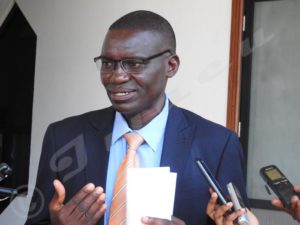Development Action and Regional Integration-ADIR Burundi has organized this 23 March a meeting with all stakeholders in the development of the agro-business. The climate and trade aspects of food security in Burundi as well as the promotion of food industry were the main focus in the meeting.

Séverin Sindayikengera, Director of CNTA: “There is a need to work in synergy”.
Nicolas Mazina in charge of Enterprise production, creation and innovation in Safina Industry Company which transforms flour and juice, says they hardly find raw materials to transform the agricultural products. “They are rare, expensive and the purchasing power is low and this causes the shortage of clients”, he says.
Mazina says the transformation of agricultural products requires more innovations which need big machines. “It is not always easy to buy such machines if we do not have any support”, he says. For him, there is a need to identify the companies which are able to transform agricultural products so that sponsors and donors may easily support them.
The same view is shared by the National Food-Processing Center-CNTA. Séverin Sindayikengera, Director of CNTA says the majority of Burundian companies involved in agro-business are faced with various challenges including the lack of raw materials, electric power, funds, quality control and packaging. “There is a need for producers and traders to work in synergy without ignoring the issue of climate change”, he says.
Godefroid Manirankunda, Director of ADIR Burundi says the meeting has been organized to promote Agriculture, Climate and Trade Linkages within East African community.
“We need to know if there are links and incoherencies between policies and laws in order to promote industrial agriculture and move towards the EAC harmonization in agro-business within the community”, he says.
Manirankunda says trade policies should facilitate the access to inputs, markets for products already transformed and modern technologies despite the climate change.














 IWACU Open Data
IWACU Open Data

